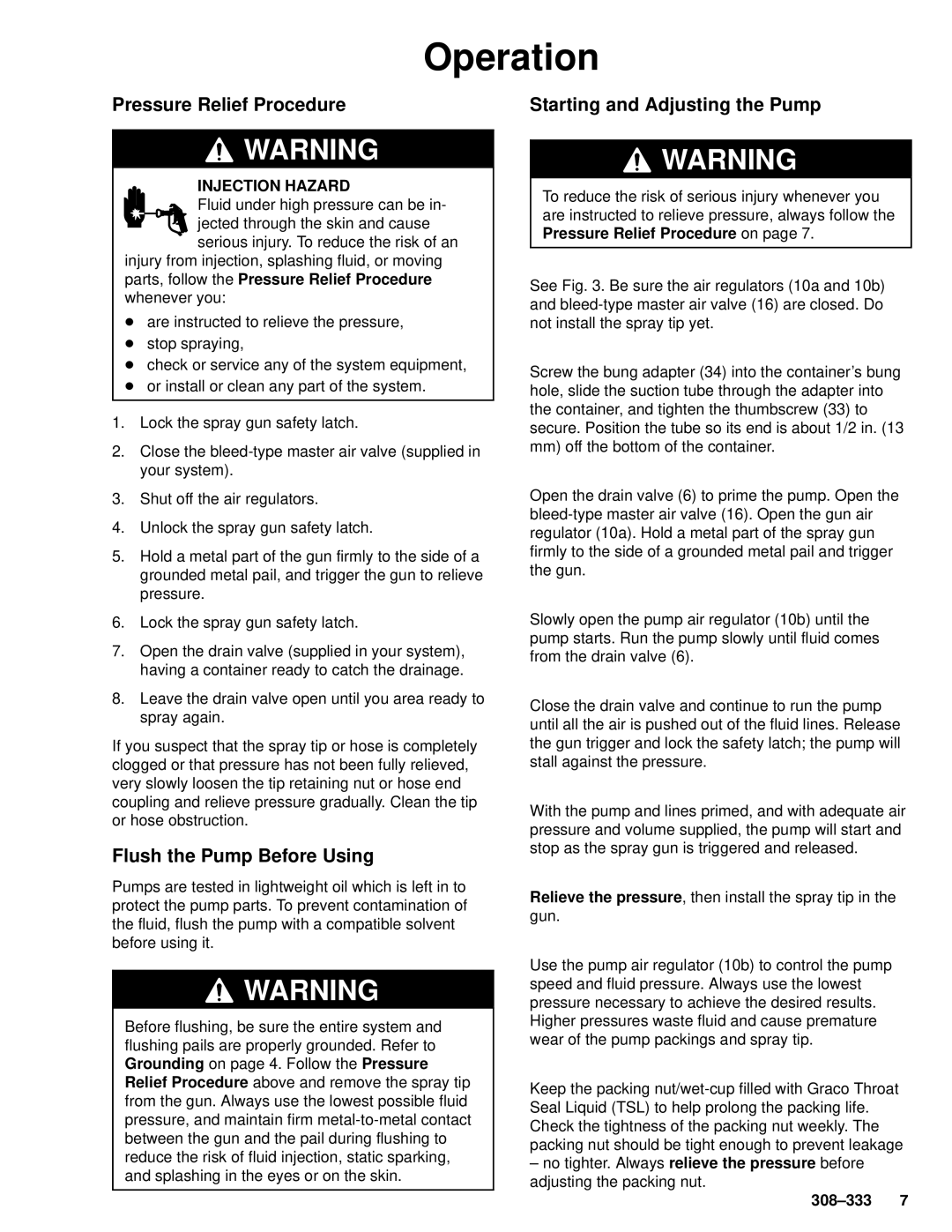
Operation
Pressure Relief Procedure
![]() WARNING
WARNING
INJECTION HAZARD
Fluid under high pressure can be in- jected through the skin and cause serious injury. To reduce the risk of an
injury from injection, splashing fluid, or moving parts, follow the Pressure Relief Procedure whenever you:
Dare instructed to relieve the pressure,
Dstop spraying,
Dcheck or service any of the system equipment,
Dor install or clean any part of the system.
1.Lock the spray gun safety latch.
2.Close the
3.Shut off the air regulators.
4.Unlock the spray gun safety latch.
5.Hold a metal part of the gun firmly to the side of a grounded metal pail, and trigger the gun to relieve pressure.
6.Lock the spray gun safety latch.
7.Open the drain valve (supplied in your system), having a container ready to catch the drainage.
8.Leave the drain valve open until you area ready to spray again.
If you suspect that the spray tip or hose is completely clogged or that pressure has not been fully relieved, very slowly loosen the tip retaining nut or hose end coupling and relieve pressure gradually. Clean the tip or hose obstruction.
Flush the Pump Before Using
Pumps are tested in lightweight oil which is left in to protect the pump parts. To prevent contamination of the fluid, flush the pump with a compatible solvent before using it.
![]() WARNING
WARNING
Before flushing, be sure the entire system and flushing pails are properly grounded. Refer to Grounding on page 4. Follow the Pressure Relief Procedure above and remove the spray tip from the gun. Always use the lowest possible fluid pressure, and maintain firm
Starting and Adjusting the Pump
![]() WARNING
WARNING
To reduce the risk of serious injury whenever you are instructed to relieve pressure, always follow the Pressure Relief Procedure on page 7.
See Fig. 3. Be sure the air regulators (10a and 10b) and
Screw the bung adapter (34) into the container's bung hole, slide the suction tube through the adapter into the container, and tighten the thumbscrew (33) to secure. Position the tube so its end is about 1/2 in. (13 mm) off the bottom of the container.
Open the drain valve (6) to prime the pump. Open the
Slowly open the pump air regulator (10b) until the pump starts. Run the pump slowly until fluid comes from the drain valve (6).
Close the drain valve and continue to run the pump until all the air is pushed out of the fluid lines. Release the gun trigger and lock the safety latch; the pump will stall against the pressure.
With the pump and lines primed, and with adequate air pressure and volume supplied, the pump will start and stop as the spray gun is triggered and released.
Relieve the pressure, then install the spray tip in the gun.
Use the pump air regulator (10b) to control the pump speed and fluid pressure. Always use the lowest pressure necessary to achieve the desired results. Higher pressures waste fluid and cause premature wear of the pump packings and spray tip.
Keep the packing
±no tighter. Always relieve the pressure before adjusting the packing nut.
